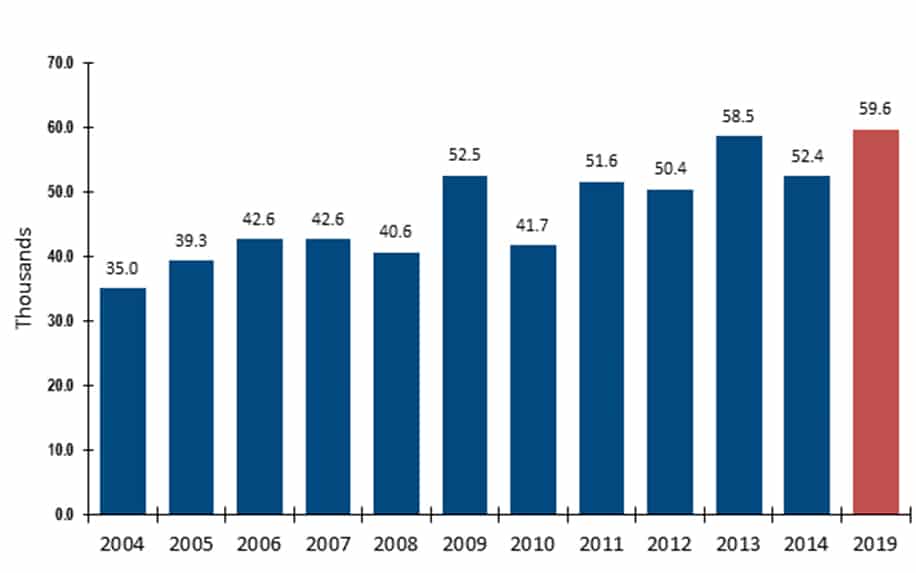Project management training has never been more beneficial for your career path. It is one of the areas of expertise that companies commonly seek, and once you have learnt how to master it, you can apply it to any role in which you might find yourself.
In this article, we’ll explore the benefits of project management training, what to expect from it and where you can find project management courses. It’s a major transferable skill and a highly sought-after one at that.
Table of Contents
What is Project Management?
The first question you may have if you are new to this area of business is, what exactly is project management? And you would be forgiven for being confused. Professional project managers often have varied roles and a diverse set of skills that are hard to summarise in just one sentence.
A simple definition of project management is
the practice of initiating, planning, executing, controlling, and completing a project. In project management, both teams and project managers are expected to meet the specific success criteria within the time constraints and goals set on a project.

If a project involves delivering a product or service to a client, project management is all about ensuring this process runs smoothly as possible, while meeting everyone’s expectations. Often, this means that a project manager is the go-between for clients and the technical or creative staff in a company.
Increasing Demand for Project Management Roles
The bottom line is that organisations run projects in order to achieve their strategic goals. These projects include everything from market expansion to the introduction of a new product and even crisis management after a major challenge.
Every business will have its own process, products, services, etc, but the one thing that remains constant is project management. It’s the bridge between an offering and delivery and regardless of industry or sector, project managers are inevitably crucial to achieving an organisation’s goals.
Because of this, the demand for skilled project managers is growing year after year. This is reflected in the steady salary growth for professionals in project management roles.

Similarly, this has led to an increase in the number of people seeking to build a career in project management. Interestingly, more and more non-specialists are seeking to acquire project management skills in order to perform their own jobs better.
Project Management Trends
The field of project management is vast and involves various roles and responsibilities essential for the successful completion of projects. Here are some statistics and insights regarding project management roles and the industry as a whole.
- Understanding the Value of Project Management:
- A recent study highlighted that 58% of organizations fully grasp the value of implementing project management to enhance performance. Conversely, this implies that 42% of companies might undervalue the significance of project management for project success.
- Adoption of Project Management Software:
- The utilization of project management software is a telling sign of the adoption of modern project management practices. As of 2023, it’s reported that the adoption rate for project management software stands at 22%, with 77% of all high-performing projects making use of such software.
- Standardization of Project Management Systems:
- Standardizing project management systems like waterfall and agile can be instrumental in streamlining processes and enhancing project outcomes. However, only 21% of companies have standardized project management systems in place.
- Employment Growth in Project Management:
- The employment of project management specialists is anticipated to grow by 6% from 2022 to 2032, which is faster than the average growth for all occupations. Annually, on average, about 68,100 openings for project management specialists are projected over the decade.
- Multitasking Among Project Managers:
- Multitasking is a common trait among project managers, with only 15% focusing on a single project at a time. The majority manage around five projects simultaneously, and in some rare instances, the number of projects handled concurrently can go up to 10.
These statistics reflect various dimensions of project management roles, including the recognition of the value of project management, the adoption of modern tools, employment growth in the field, and the multitasking nature of project managers.
With that in mind, let’s dive into the benefits of project management training.
What Does Project Management Training Entail?
A professional project manager needs to have enough knowledge and experience to exploit the resources and tools allocated to the project. A skills management platform becomes an invaluable asset, enabling project managers to effectively identify and utilize the unique skills and competencies within their teams. As simple as that might sound, the project management process is quite complex.
That’s why project management training has become essential for landing a position in any organization. In earlier years, you would land a job as a project manager solely by experience and seniority, but nowadays, there is an increasing expectation for professional accreditation.
Things have changed drastically in the business world. It’s no longer easy to land a project management role without specific training and experience. Project management is now more of a science than a craft, and people spend time, energy and effort into learning that science. In this rapidly evolving landscape, Learning Management Systems (LMS) have revolutionized the acquisition of project management skills by providing comprehensive repositories of knowledge, offering structured access to courses, modules, and resources that enhance understanding of project methodologies, tools, and best practices in our rapidly evolving landscape.
Essential Project Management Skills
To give you a better idea of what project management training entails, it’s worth considering the kinds of skills which are necessary to succeed in a project manager role. Generally, these are the kinds of transferable skills which will be of benefit to just about any professional.
This means that acquiring the core skills of project management through suitable training is a sound investment, pretty much irrespective of your job title or career goals. Let’s take a closer look at the desired skills and qualities of project managers.
Communication
Proper communication ensures that the project’s objectives are clear to everyone involved. This avoids confusion which does not only waste time and resources but might also be demoralizing to the individuals who did not get a clear message.
A poorly received message might cause the individual to question their importance in a project. This individual might distance themselves from the other members. This does nothing but create differences and cause inefficiencies, which are ultimately detrimental to the success of a project.
Making sure that your message is clearly received by the team is not the only use of communication. Good communication must be two-way. Any individual in the team should have no trouble expressing their concerns about any aspect of the project.
After all, each member has their own specialisation which may provide useful insight when something is wrong. This saves you valuable time and resources which would otherwise be wasted on a not-so-optimal plan. Project managers facilitate a culture of communication, where ideas and opinions are freely shared.
Team Management
To create a productive project team, it is important to focus on aspects of teamwork. A project manager should be able to identify members that will work great together. Creating a team identity is a major motivator to individuals where they feel like their group is responsible for the success of the project.
This turns it from an assigned task to a project that they care about.
However, this is not an easy task as it is also necessary to assess both the team’s and individual’s performance. It is up to the project manager to provide feedback to improve performance. This might prove to be tricky since feedback might sometimes be taken personally if the message is not delivered properly.
Leadership
A good leader doesn’t just tell people what to do. It is important to ensure that every member of the team is dedicated to the project. Good leadership involves resolving conflict, delegating tasks to the most relevant members and ensuring that the project’s goals are being met in a timely manner.
Another crucial element of leadership is getting the most out of team members who are working on a project. This requires good project managers to keep team members motivated and ensure they have all the resources they need to do their job properly. They are the facilitators for the delivery of a successful project outcome.

Resource Management
It is not possible for the project manager to be experienced in every single thing involved in the project. However, they should be able to assess the necessary resources needed to accomplish a certain task. This skill allows the manager to create a project plan that efficiently estimates the amount of resources that this project will require.
Time Management
Setting realistic timescales will also ensure that the productivity of the project is kept on track. Team members should know what they have to do and how long they have to actually do it. This will help increase motivation if your team members can see the end in sight for the project.
On the other hand, if the project timetable is unrealistic, your members will slack because they know that their effortless are fruitless, regardless of how hard they work. It has to be the right balance in order to encourage motivation and hard work.
It is not uncommon for a project to be terminated because of exceeding its expected budget or allocated time frame which only incurs costs for your business. Additionally, if you get a reputation for poor delivery, you’ll struggle to gain new business in future.
Risk Assessment
A great approach to ensuring the success of the product is to predict obstacles and start working on their solutions pre-emptively. This is a good utilisation of the manager’s time since they should be delegating current tasks to their team anyway.
The manager is then able to have a clear overview of the whole project allowing them to predict most future obstacles and avoid any scope creep. Early observation of these hurdles gives the manager time to consider the pros and cons before it’s time to make a critical decision.
The Process of Project Management Training
Project management training aims at preparing the person for handling all five steps of the project management process. The goal here is to divide all projects down into a similar framework. This makes the process of delivering projects much more efficient.
Here are the five stages of the project management process.
Initiation
This step, as should be clear from its name, is the first step in the process of project management. With project management training, aspiring project managers should be prepared for how to create a project and set it in place.
The initiation step entails setting a general compass for the project to follow. This includes the project’s final objectives, as well as the methods and project management techniques the team will adopt.
The initiation stage is also when clients should be made aware of what is required of them. For example, it’s incredibly common for projects to be delivered late because clients fail to provide their required inputs.
The project manager is then responsible for explaining this. As such, it’s much simpler for everyone to have clear expectations from the outset.
Planning
Here is where the detailed tactics that the project manager and the team will be using to achieve the pre-set objectives are decided upon. This includes specific methodologies, approaches and techniques.
This is an important element of project management skills to improve as the details you need to consider during planning can make or break a project. It is also helpful for explaining to clients why a project takes as long as it does, or why it costs what it does.
In planning, a project manager needs to incorporate everything from the time needed to complete each element of the project to the team members needed throughout the project. This also helps with planning for future road bumps, by helping you identify where specific problems may arise.
Execution
Once the planning of the project has been confirmed and set in place, this is the step where the project manager implements the plan and tasks begin. Typically, execution is split into pre-agreed milestones, or phases of deliverables.
During this stage, it is essential that high-quality maintenance is carried out to ensure no mistakes or delays will affect the success of the project. For instance, it’s worth creating contingency plans if one milestone overruns or is delayed.
Controlling
Project managers usually bear a major part of the burden in this step. That is where they monitor, evaluate, and take corrective action if necessary. Essentially, this is all about ensuring that the goals of the project are actually met
This could be, for example in construction project management, if there is a delay in the delivery of building materials which could delay the project, the project manager should have alternative plans for other places they could source them or other work that could be completed to avoid time wasted.
Closing
This is the final phase of any project, and it is where the evaluation takes place. That is where a project manager needs a sharp eye for detail to gather information and highlight what worked well and where there were weaknesses within the project.
This information will be used to report back to management and to improve future project planning and project management. Good project managers understand the importance of constant improvement in their processes.
Project management training intends to install all of the skills necessary for each of these stages into the mind of a future project manager. Additionally, it provides theoretical knowledge for each stage related to the practical elements of project delivery.
By the time one has successfully passed a project management training program, they should be able to systematically handle each and every phase we mentioned above. They can then build on this knowledge with industry experience.
Skills for Project Management Success
Success in project management demands a mix of diverse skills. These skills can be broadly categorized into technical, interpersonal, and managerial competencies.
Here are some vital skills for successful project management:
- Technical Proficiency:
- Project Planning: Ability to develop detailed project plans including timelines, budgets, and resources.
- Risk Management: Identifying, evaluating, and mitigating risks that could impact project objectives.
- Quality Assurance: Ensuring the project’s deliverables meet the required quality standards.
- Technical Understanding: Knowledge of the technical aspects relevant to the project.
- Interpersonal Skills:
- Communication: Effective communication with team members, stakeholders, and other relevant parties.
- Team Leadership: Ability to lead, motivate, and manage a team towards achieving project goals.
- Conflict Resolution: Resolving conflicts in a constructive manner to maintain a positive working environment.
- Negotiation Skills: Negotiating terms, conditions, resources, and other project elements with stakeholders.
- Managerial Competencies:
- Time Management: Efficiently managing time to ensure project tasks are completed within set timelines.
- Budget Management: Monitoring and controlling project costs to meet budgetary constraints.
- Resource Management: Allocating and managing resources effectively to ensure project success.
- Decision-Making: Making informed decisions quickly to keep the project on track.
- Adaptability:
- Change Management: Adapting to changes in project scope, timelines, or resources in a structured manner.
- Problem-Solving: Identifying problems and devising effective solutions to keep the project moving forward.
- Learning Agility: Willingness and ability to learn from experiences and apply these learnings to future projects.
- Technological Aptitude:
- Software Proficiency: Familiarity with project management software tools like Microsoft Project, JIRA, or Trello.
- Technical Innovation: Staying updated with the latest technologies and methodologies in project management.
- Professional Development:
- Continuous Learning: Engaging in lifelong learning and professional development to stay updated in the field.
- Certifications: Earning relevant certifications like PMP (Project Management Professional) or PRINCE2.
- Ethical Responsibility:
- Ethics and Integrity: Adhering to a code of ethics and maintaining high levels of integrity in all project dealings.
Each project may require a unique blend of these skills, and successful project managers often exhibit a balance of technical know-how, effective interpersonal skills, and strong managerial competencies. Project management courses not only teach you these skills, but they also teach you how to practically combine them.
These are but a few of the business skills that project management training has to offer you. So are there any recommended project management courses?

Popular Online Project Management Training Courses
The next thing to think about is which project management training course is right for you. Naturally, this depends on a number of different factors, including your specific needs, goals, practical concerns and availability.
BrainSensei
BrainSensei qualifies you to pass the PMP test. This project management course is somewhat intensive, but that is without rushing through topics. The course is smoothly designed to take you on a fast-paced yet comprehensive journey through the concepts and techniques central to project management.
It is pretty fun, too. You would expect project management training to be a set of tedious lectures, but this one is actually far from the case. This course is given through a series of animated stories.

Another good feature of this course is that you get to evaluate yourself. The course doesn’t include dated tests or anything of the sort. You get six modules and more than 900 self-assessment tests to cover them. That gives you the flexibility to finish up the course according to your own schedule without pressure.
Simplilearn
Simplilearn has the advantage of variety. It offers both self-paced courses that you can finish up according to your own timeframe and instructor-led project management classes. The latter is great if you enjoy group learning. These ones have specified start and end dates, though. So, if you are looking for a more time-flexible course, you should probably go for the first option.

The Project Management Expert bundle they offer would get you fully qualified for a PMI certification. That bundle consists of six project management modules and a software course. The last course would definitely better your profile as a project manager. Software knowledge has never been more highly demanded especially in high-level management positions.
The Junior Project Manager
That is a project management course that delivers its material through storytelling. It is definitely the most effective learning method, especially for those new to project management. The Junior Project Manager is provided by Blendlee Learning Technologies UG in Berlin.
The name of the course is actually the name of the character teaching it. The Junior Project Manager is a character that in every class gives lessons in project management through the day-to-day stories he tells to his audience.
There are both an introductory course that gives you knowledge of the basic project management techniques, principles and concepts, and more in-depth modules that can qualify you to pursue a PMP certification.

There are hundreds of other online project management classes, but these ones have been hailed as some of the best courses available on the web right now. The cost of taking one of these courses is also not entirely unreasonable and if you’re willing to expand your knowledge, you could be the next person to meet the job market or your employer’s needs for project management skills.
Project Management Software
There are a variety of project management software options as well as project management tools that can be used by a business to support their projects and complete them successfully.
Project Management Software (PMS) is a crucial tool that aids in planning, executing, and monitoring projects efficiently. These tools are designed to facilitate collaboration, manage resources, and ensure projects stay on track concerning timelines, scope, and budget. Here are some popular project management software and their features:
- Trello:
- Visual Project Management: Utilizes Kanban boards to visualize tasks and project progress.
- Collaboration: Enables team collaboration with comments, attachments, and task assignments.
- Asana:
- Task Management: Allows for the creation, assignment, and tracking of tasks.
- Timeline View: Visual timeline to plan projects, set deadlines, and see overlapping tasks.
- JIRA (by Atlassian):
- Agile Project Management: Supports Scrum, Kanban, and other agile methodologies.
- Bug and Issue Tracking: Ideal for software development projects.
- Microsoft Project:
- Comprehensive Project Planning: Advanced planning and scheduling features.
- Resource Management: Allocate and manage resources, including staff and budget.
- Basecamp:
- Centralized Communication: All project discussions, files, tasks in one place.
- To-Do Lists: Create to-do lists, set due dates, and assign tasks to individuals.
- Monday.com:
- Work OS: Customizable work operating system to manage any project or workflow.
- Automation: Automate routine work to save time and ensure consistency.
- Smartsheet:
- Flexible Platform: Combines spreadsheets, timelines, and other essential project management features.
- Real-time Collaboration: Share sheets, view changes in real-time, and collaborate with teams.
- Wrike:
- Interactive Timelines: Gantt charts for project planning and progress tracking.
- Customizable Dashboards: Tailor dashboards to meet the unique needs of different projects.
- ClickUp:
- All-In-One Platform: Features include tasks, docs, goals, and chat.
- Custom Views: Customize views for tasks, timelines, boards, and more.
- Zoho Projects:
- Time Tracking: Log hours, create invoices, and record all project activities.
- Document Management: Centralized document storage for easy access and sharing.
These tools vary in terms of functionality, user interface, and pricing, so it’s advisable to consider the specific needs of your project or organization when selecting a project management software. Each software has its strengths and is tailored to different types of projects and organizational needs.
Project management start to finish example
Here’s an illustrative example of a project management process from start to finish using a hypothetical scenario of launching a new product.
1. Initiation:
- Project Identification: The company identifies the need for launching a new product to meet market demand.
- Feasibility Study: Assess the feasibility of the project in terms of market acceptance, cost, time, and resources.
2. Planning:
- Project Charter: Create a project charter that outlines the project’s objectives, scope, purpose, and deliverables.
- Work Breakdown Structure (WBS): Break down the project into smaller, manageable tasks.
- Timeline and Milestones: Establish a timeline with milestones, deadlines for each task.
- Budgeting: Allocate budget to different tasks and resources.
- Resource Planning: Identify and allocate the necessary resources including personnel, technology, and materials.
3. Execution:
- Team Building: Assemble the project team and provide necessary training.
- Development: Begin the development of the new product as per the planned design and specifications.
- Quality Assurance: Perform quality checks to ensure the product meets the required standards.
- Communication: Maintain regular communication among the team, stakeholders, and other involved parties.
4. Monitoring/Controlling:
- Performance Monitoring: Track the progress of the project against the plan.
- Risk Management: Identify potential risks and implement mitigation strategies.
- Change Management: Manage any changes in project scope, timeline, or budget.
5. Closing:
- Completion: Ensure all aspects of the project are completed satisfactorily.
- Evaluation: Evaluate the project performance against the initial objectives and identify lessons learned.
- Delivery: Launch the new product to the market.
- Post-Project Review: Conduct a post-project review to analyze what went well, what didn’t, and why.
6. Post-Completion:
- Customer Feedback: Collect and analyze customer feedback for the new product.
- Continuous Improvement: Utilize the feedback and the lessons learned for the continuous improvement of future projects.
This illustrative example provides a simplified overview of a project from initiation through to post-completion, highlighting the various stages and tasks involved in managing a project to successful completion. Each stage has its own set of processes and deliverables that contribute to the overarching goal of launching a new product in this scenario.
Why Take Project Management Training
Project management can be intimidating for anyone and the format can change as each project is different. Taking on project management training will support any project manager in carrying out a successful and effective project no matter what industry they are based in.
The core role of a good project manager is ensuring the client’s goals and expectations are met in the most efficient and cost-effective way possible.
This requires a pretty diverse range of transferable skills, as well as knowledge of the most effective frameworks for delivering projects. Additionally, industry experience builds on these skills to help you grow into a well rounded professional project manager.
SEE ALSO: SQL | Resistance To Change Management | What is Management Consulting | Managing Resistance To Change.


